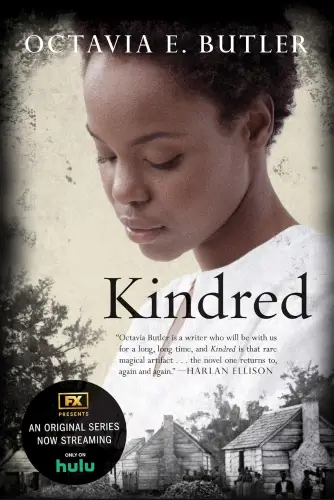Kindred
Book Author: Octavia E. Butler
Summary reviewed by:
Terrence Timmons
Terrence Timmons
Analyst
Bachelor of Arts (BA), University Of California, Santa Barbara 2019
With over 4 years of experience as an analyst. Terrence Timmons is committed to analyzing summaries without compromising on quality.
Kindred: Summary
What would you do if you were suddenly thrust into the brutal reality of slavery in the antebellum South? Kindred pulls you into the life of Dana, a modern African-American woman in 1976 Los Angeles, whose life is shattered when she’s inexplicably yanked back in time to a Maryland plantation in 1815. Dana’s disorienting journey begins when she saves a drowning white boy, only to discover that this child, Rufus, is her ancestor. This revelation binds her to a horrifying past where she must ensure his survival to protect her own existence.
The novel navigates the complexities of slavery, race, and identity as Dana is repeatedly drawn back to the plantation, each time facing more danger and moral dilemmas. The time-travel element is not just a plot device but a profound exploration of how the past haunts the present, both physically and psychologically. Dana's struggle to survive and maintain her sense of self in a world that sees her as property is as much a battle against the past as it is a fight for her future.
Kindred is not part of a series but stands as a powerful, standalone work that delves into the horrifying realities of American slavery through a science fiction lens. The novel’s blend of historical fiction and speculative elements creates a narrative that is both harrowing and thought-provoking, offering readers a visceral experience of history that is deeply personal and universally relevant. This is a must-read for those interested in confronting the legacy of slavery and its enduring impact on modern society.
Spoilers (watch a short ad to reveal spoilers)
Kindred: Genres
African American Literature
Historical Fiction
Speculative Fiction
Time Travel Adventure
Psychological Fiction
Kindred: Main Characters
Dana Franklin: A modern African-American woman and aspiring writer from 1976 Los Angeles. She values autonomy, courage, and survival, demonstrated by her ability to navigate the horrors of slavery while preserving her sense of self and history.
Rufus Weylin: A white plantation owner’s son in 19th-century Maryland. He values power and control, often manipulating those around him to maintain his authority. His complex relationship with Dana reveals his dependence on her for survival, yet he continually betrays her trust.
Kevin Franklin: Dana’s white husband, a writer who values equality and loyalty. His love for Dana is tested when he is also transported back in time and witnesses the brutal realities of slavery, yet he remains committed to her and their shared future.
Alice Greenwood: A free Black woman forced into slavery, and Rufus’s eventual mistress. She values freedom and dignity but is ultimately broken by the oppressive system. Her tragic fate is a powerful reflection of the dehumanizing effects of slavery.
Tom Weylin: Rufus’s father and the plantation owner. He values tradition and maintaining the status quo, enforcing the harsh realities of slavery on those under his control. His interactions with Dana highlight the brutal, unyielding nature of the era.
Kindred: Themes
Slavery and Racism: The novel explores the brutality of American slavery, depicting the dehumanization and systemic oppression faced by Black people. Through Dana’s experiences, the book exposes the enduring impact of racism, both historically and in contemporary society.
The Power of History: Kindred examines how history shapes identity and relationships. Dana’s repeated journeys to the past force her to confront the painful realities of her ancestors, highlighting the inescapable influence of history on the present.
Survival and Resistance: The characters in Kindred navigate a world where survival often means compromising one’s values. Dana’s struggle to maintain her integrity while ensuring her own survival and that of Rufus underscores the theme of resistance against oppressive forces.
Family and Ancestry: The novel delves into the complexities of familial bonds, especially those twisted by the institution of slavery. Dana’s relationship with Rufus illustrates the conflicting emotions that arise from the knowledge of her own ancestry.
The Intersection of Time and Memory: The fluidity of time in Kindred serves as a metaphor for the way memory and trauma transcend generations. Dana’s experiences in the past leave physical and emotional scars, emphasizing how the past continually shapes the present.
Kindred: What You Need to Know
(Contains Spoilers: Perfect for readers seeking a quick review.)
Kindred begins with Dana Franklin, a Black woman living in 1976 Los Angeles, who is suddenly and inexplicably transported back in time to 19th-century Maryland. The first time this occurs, she saves a young white boy named Rufus from drowning, only to be violently thrust back into her own time. Dana soon realizes that Rufus is her ancestor, and her life becomes irrevocably tied to his survival.
As Dana continues to be pulled back into the past at critical moments in Rufus's life, she must navigate the dangerous and oppressive world of slavery. Each trip becomes more perilous as Dana is forced to confront the brutal realities of the time, including the risk of being enslaved herself. Her knowledge of history and her relationship with Rufus become her tools for survival, but they also entangle her in moral quandaries as she grapples with the need to ensure Rufus's safety to protect her own future.
Dana's husband, Kevin, is also transported back in time during one of her journeys, further complicating the situation. While he is horrified by the world they find themselves in, his status as a white man allows him a level of safety that Dana does not have. Their relationship is tested by the harsh conditions and the long periods they are separated when Dana is pulled back to her time without warning.
Rufus grows into a tyrannical and manipulative man, his character shaped by the cruel environment of the plantation. His obsession with Dana's respect and affection leads to increasingly dangerous situations. Despite Dana’s attempts to guide him towards better choices, Rufus becomes more like his father, enforcing the brutal norms of the era.
In the novel's climax, Dana is forced to kill Rufus in self-defense when he attempts to sexually assault her, breaking the cycle of time travel. This final act severs her connection to the past, allowing her to return to 1976 permanently. However, Dana is left physically scarred, a reminder of the trauma she has endured and the history that can never be fully escaped.
Kindred concludes with Dana and Kevin visiting the remnants of the Weylin plantation in the 20th century, where they find that the legacy of slavery has left its mark on both the land and their lives. The novel underscores the lasting impact of slavery on individuals and society, emphasizing that history is always present, shaping the lives of those who come after.
Kindred: Methodology
We ensure that our summaries connect with what matters to you, focusing on key themes like the enduring impact of history and the complexities of survival. With a deep understanding of literature, we delve into the narrative to extract its most pivotal moments, ensuring every summary is a true reflection of the original work. Our commitment to accuracy and clarity guarantees that what you read is not only engaging but also reliable, providing insights that stay with you long after you've finished reading.


Kindred
Date Published: June 1979
Disclaimer: As an Amazon Associate I earn from qualifying purchases.




